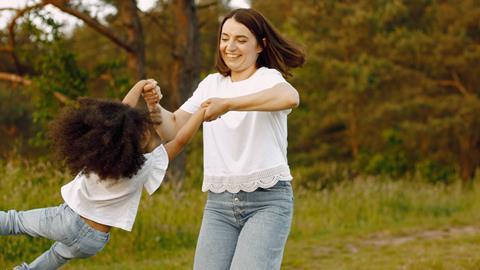Cathy Madavan on why the great outdoors should not be restricted to the playground of men and boys
I think it’s fair to say I was not much of an adventurer growing up. Times were possibly different then, but where my teenage brother was bought a mountain bike, I was given piano lessons; where he was asked to join the cricket team, I was shuffled into the kitchen to make the tea for the players. These rather limiting expectations scuppered my sense of adventure somewhat and, despite opportunities to try camping or windsurfing in later years, I’d simply opt out. For years I didn’t have the confidence to embrace any new experiences in the great outdoors.
As a mother of daughters, I was determined that the girls’ outdoor experiences would not be limited to making teas for men or trailing around a golf course watching their male counterparts participating like I did. I am still no Bear Grylls, and I’m not one for cold-water swimming or hiking through forests. And yet in a screen-laden, highly scheduled world, parents, teachers and caregivers all have a profound responsibility to nurture our children’s connection with the natural world. We may have different personalities or physical limitations, but we can all enjoy and encourage a love of God’s glorious creation.
Unleashing the power of outdoor play
Science tells us that fostering a love for nature is not only essential for children’s physical health, but also for their emotional and cognitive development. Children’s brains develop the areas of imagination and creativity before logic and reasoning, so being immersed in the natural world and learning through play is formative in so many ways.
Nature is endlessly fascinating for children. What could be more mesmerising than a wriggling worm or more awe-inspiring than a brightly coloured kingfisher bird diving into the water? Children are instinctively curious about the textures of soil, stone, grass, sand, mud and snow; they are in awe of rainbows, caterpillars, fossils, trees and oceans – and who could disagree with them?
With this in mind, I encouraged my girls to use the garden as their playground and exploration space. We made an outdoor restaurant called ‘Eat what you like’, where the meals were highly questionable but fun was always on the menu! We also had guinea pigs (and accidental guinea pig babies) roaming about the grass. We’d often eat and play outside and, as the girls got older, we’d hang out around the firepit with blankets, marshmallows and hot chocolate. Of course, not everyone has a garden, but growing veggies and other plants in pots as well as trips to parks, petting zoos and other beautiful places contain wonder for young and curious minds. Anything that encourages learning, physical play and interaction with the natural world is worth pursuing – even if it means getting a bit messy!
Connecting with our Creator God
Isn’t it interesting how faith is often linked with distinctly ‘indoor’ behaviour – singing, reading, crafts and sitting still for example? But our planet is God’s handiwork and, while our daughters’ faith benefitted from wonderful ministry at church, the natural world also instinctively inspired their faith. Once I’d made that connection, it didn’t take much imagination to turn outdoor expeditions into faith-filled adventures. Even a regular welly walk through the park was an opportunity to collect different branches or leaves we could turn into a picture about God’s creation. We could use pebbles – either as a prayer to throw into the sea or to draw and paint onto back at home. One mum I know used shells and pebbles placed in a pot on the dinner table to help her family to pray each day. Friends and family names were written on each and one was picked at random at every mealtime to pray for.
You could go for a walk and spot things starting with the same letter or just stop and listen to the sounds near a river together. Anything in the natural world can provoke awareness of our amazing Creator God and can naturally lead into conversations about conservation, sustainability and caring for the world we have been given – important issues for Christians of all ages to engage with.
Stepping out and taking risks
As I’ve said, I was more engaged in learning piano scales than scaling mountains during my formative years. But I now realise that learning to take risks, playing team sports and just ‘having a go’ at things are vital skills for life. Research continually suggests that women are more cautious and less willing to take risks than men, partly due to worrying more about failure and adverse consequences – and this is often determined in our childhood years. But how will we ever step out and try something new (be that in our career, for fun or in our faith) if we’ve always learned to play it safe? Do we really want our daughters to settle in their comfort zone or do we want them to be free to dare more, to dream more and to learn from the journey, whatever the outcome? I think the answer is obvious!
Anything in the natural world can provoke awareness of our amazing Creator God
Therefore, as far as we have been able (despite limited budgets and my husband’s blindness to navigate), we have encouraged comfort-zone-busting activities like kayaking, zip wires, long walks and even a memorable ride on an elephant! You might already be a mountain climbing, skiing professional who goes bungee jumping each weekend, and our meagre efforts might seem tame to you. But learning to stretch ourselves in any way is formative and builds resilience both psychologically and spiritually. Whether that means family park runs, developing a veggie patch, taking a dog on a walk, paddleboarding down a river or learning to be creative or prayerful in new ways, we gain so much by stepping outside to understand more about ourselves and the planet we inhabit together as humans.
While chores, gadgets, homework and deadlines are always a pressure, my motto for the summertime is going to be this: less screen time, and more green time! Children and adults alike – it’s always good to embrace more of the great outdoors.


































No comments yet